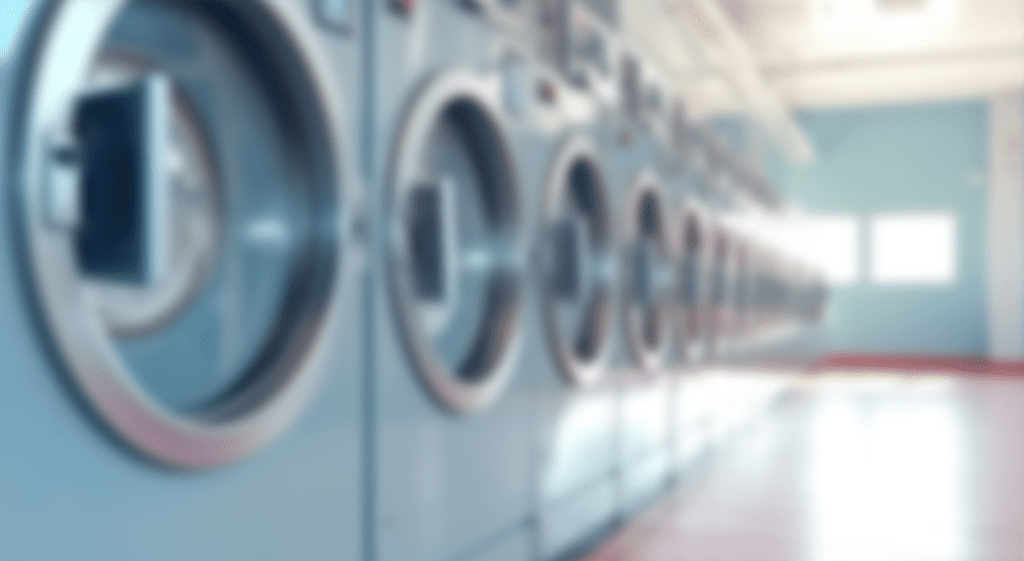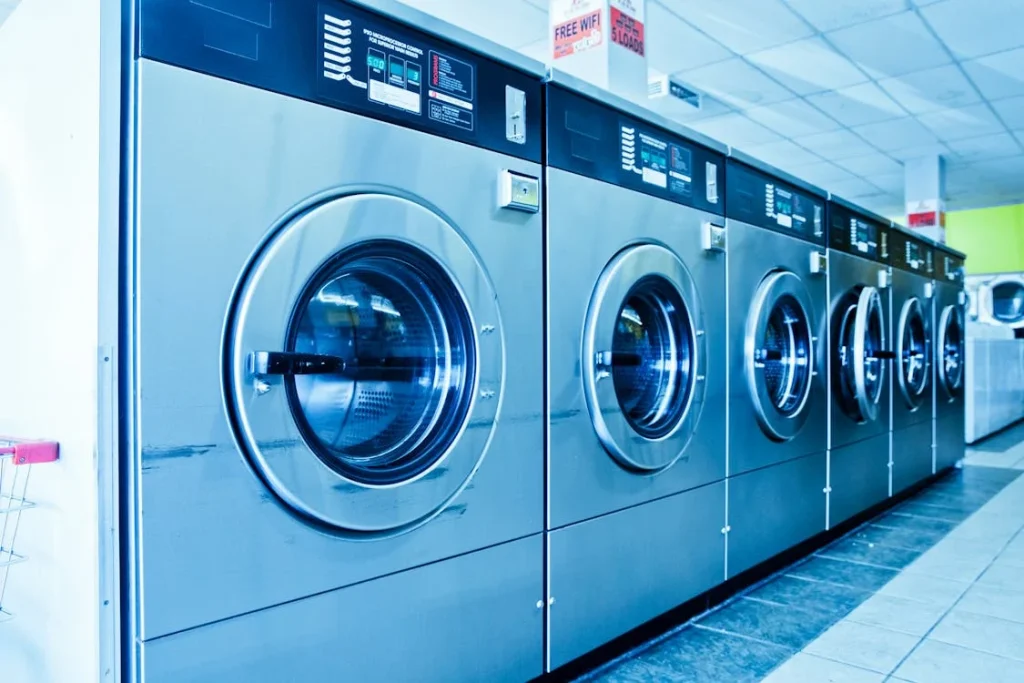Industrial washing machines are the backbone of many laundromats, hotels, hospitals, and other businesses that rely on large-scale laundry operations. If you want to keep your machine running efficiently, prevent costly repairs, and extend its lifespan, there are a few key strategies to follow. In this guide, we’ll walk through the best practices to ensure you’re getting the most out of your industrial washing machine maintenance.
Table of Contents
- 1. Industrial Washing Machine Maintenance Intro
- 2. Regular Cleaning and Industrial Washing Machine Maintenance
- 3. Optimizing Load Capacity
- 4. Choosing the Right Detergent and Additives
- 5. Managing Water Temperature
- 6. Regular Inspection of Parts and Components
- 7. Efficient Use of Energy and Water
- 8. Scheduling Industrial Washing Machine Preventative Maintenance
- 9. Training Staff for Optimal Performance
- 10. Troubleshooting Common Issues
- 11. Conclusion: Maximize Your Washing Machine’s Efficiency
- 12. FAQs

1. Industrial Washing Machine Maintenance Intro
Before you can make the most of your industrial washing machine, it’s essential to understand its structure, components, and functionality. Knowing your machine inside and out will help you troubleshoot issues quickly and take proactive steps to prevent problems.
1.1. Types of Industrial Washing Machine Maintenance
Industrial washing machines come in a variety of designs to suit different needs. The main types include front-loaders, top-loaders, and tunnel washers. Front-loaders are typically more water-efficient and gentle on fabrics, while top-loaders are often easier to maintain and repair. Tunnel washers are ideal for high-volume operations, such as in laundromats or hospitals.
1.2. Common Features and Functions
Industrial washers are loaded with features such as adjustable spin speeds, multiple wash cycles, automatic detergent dispensing, and load-sensing technology. Familiarizing yourself with these features can optimize your washing process and improve efficiency.
2. Regular Cleaning and Industrial Washing Machine Maintenance
Routine cleaning and maintenance are essential for prolonging the life of your machine and keeping it running smoothly. Without regular upkeep, dirt, detergent residues, and limescale buildup can cause major malfunctions.
2.1. Daily Maintenance Tasks
Make it a habit to clean the lint filters, check for foreign objects in the drum, and wipe down the machine’s exterior. Regular checks for leaks and unusual sounds are also essential to catch potential issues early.
2.2. Weekly and Monthly Maintenance
Perform more thorough maintenance tasks on a weekly or monthly basis. Clean the internal filters and ensure that hoses and valves are free from blockages. This will help avoid clogs that could interfere with the washing cycle.
2.2.1. Cleaning the Drum and Filters
The drum is where all the washing action happens, so it’s important to keep it clean. Over time, detergents and lint can accumulate, causing unpleasant odors or even damaging the machine. Running an empty cycle with vinegar can help clear up any buildup.
2.2.2. Lubricating Moving Parts
The bearings and other moving parts of your industrial washer need to be lubricated regularly to prevent wear and tear. Consult the machine’s manual for recommended lubrication schedules and procedures.
3. Optimizing Load Capacity
The way you load your industrial washing machine can significantly affect its performance and lifespan. Loading it properly will ensure that clothes are cleaned efficiently and that the machine is not overworked.
3.1. How to Load Your Machine Properly
Load your washing machine evenly, distributing the clothes around the drum to maintain balance. Avoid overloading, as it can strain the motor and lead to poor washing performance.
3.2. Avoiding Overloading
Overloading your industrial washer is one of the fastest ways to damage it. It can result in poor cleaning, detergent residue left on clothes, and even drum misalignment. Always follow the manufacturer’s recommended load size.
4. Choosing the Right Detergent and Additives
The type of detergent you use is crucial for achieving the best cleaning results. Using the right detergent also helps preserve your machine’s longevity.
4.1. Types of Detergents for Industrial Machines
Industrial washing machines require specific detergents that are formulated to work under high temperatures and heavy loads. Make sure to use the detergent type recommended for your machine to prevent issues like buildup or damage to components.
4.2. Detergent Dosage and Efficiency
Avoid using excessive detergent. Not only can this lead to detergent residue on your clothes, but it can also damage the internal components of your washing machine. Follow the manufacturer’s guidelines for the correct detergent dosage.
5. Managing Water Temperature
Water temperature plays a significant role in the cleaning process. Different fabrics require different temperatures, and using the right one ensures that your clothes come out clean without compromising their quality.
5.1. Impact of Water Temperature on Cleaning
Hot water is ideal for tough stains and heavily soiled items, while cold water is gentler on delicate fabrics. Balancing the temperature according to the load will help your machine work efficiently.
5.2. Finding the Right Balance
It’s important to find the balance between temperature and fabric type. In general, most industrial washing machines will have settings that automatically adjust based on the load size and fabric type, but being mindful of this will further optimize results.
6. Regular Inspection of Parts and Components
To prevent breakdowns, make sure to regularly inspect parts like hoses, valves, and the drum. Identifying issues early can save you time and money on repairs.
6.1. Checking Hoses and Valves
Ensure that water hoses are in good condition, and there are no kinks or leaks. Inspect valves for any signs of damage or wear, and replace parts as necessary to avoid leaks or malfunctions.
6.2. Monitoring Drum Integrity
Keep an eye on the drum for any signs of wear, such as cracks or dents. A damaged drum can be a costly repair, so early detection is crucial.
7. Efficient Use of Energy and Water
Energy and water efficiency are important for both operational costs and environmental impact. By optimizing usage, you can reduce both.
7.1. Using Energy-Efficient Programs
Many industrial washing machines come with energy-saving programs that use less electricity and water. These settings are usually sufficient for everyday laundry needs.
7.2. Reducing Water Consumption
Consider using a low-water setting for lighter loads. This will save both water and energy without compromising washing performance.
8. Scheduling Industrial Washing Machine Preventative Maintenance
Preventative maintenance is key to keeping your machine running smoothly. By scheduling regular checks and maintenance, you can avoid unexpected breakdowns.
8.1. Benefits of Preventative Maintenance
Scheduled maintenance ensures that your industrial washing machine is regularly cleaned, inspected, and maintained to prevent issues from escalating.
8.2. Creating a Maintenance Schedule
Set up a routine maintenance schedule, including daily, weekly, and monthly tasks. Stick to it religiously to ensure your washing machine stays in peak condition.
9. Training Staff for Optimal Performance
A well-trained team is essential for getting the best performance out of your industrial washing machine.
9.1. Training Operators on Best Practices
Train operators on loading techniques, detergent usage, and the proper handling of the machine. The more knowledgeable your staff, the better the results.
9.2. Regular Staff Refresher Courses
Regular refresher courses help keep everyone updated on the latest operational practices and maintenance tasks.
10. Troubleshooting Common Issues
No matter how well you maintain your machine, sometimes issues arise. Knowing how to troubleshoot common problems can save you time and effort.
10.1. Common Problems and Solutions
If your machine isn’t draining properly, check for clogs in the hoses or drain pump. If there’s excessive vibration, verify that the load is balanced.
10.2. When to Call a Professional
Some issues, like electrical malfunctions or drum misalignment, require professional intervention. Always know when to call a technician.
11. Conclusion: Maximize Your Washing Machine’s Efficiency
By following these tips and regularly maintaining your industrial washing machine, you can maximize its efficiency, reduce repair costs, and extend its lifespan. Don’t forget to train your team and schedule preventative maintenance to keep things running smoothly. Remember, a well-maintained machine is a more productive and cost-effective one!
12. FAQs
1. How often should I clean my industrial washing machine?
Regular daily cleaning is necessary, but deep cleaning and maintenance should be done weekly or monthly, depending on usage.
2. Can overloading my washing machine damage it?
Yes, overloading can cause poor performance, increased wear, and even damage to internal components.
3. What detergent is best for industrial washers?
Use detergents specifically formulated for industrial washers to prevent damage and achieve the best cleaning results.
4. How can I improve energy efficiency?
Opt for energy-efficient cycles and adjust water temperature based on the load type to reduce energy consumption.
5. What should I do if my machine is vibrating excessively?
Check if the load is balanced properly. If the vibration continues, inspect for issues with the drum or suspension system.
Here are some other articles that we think might interest you:
Environmental Impact of Industrial Laundry


